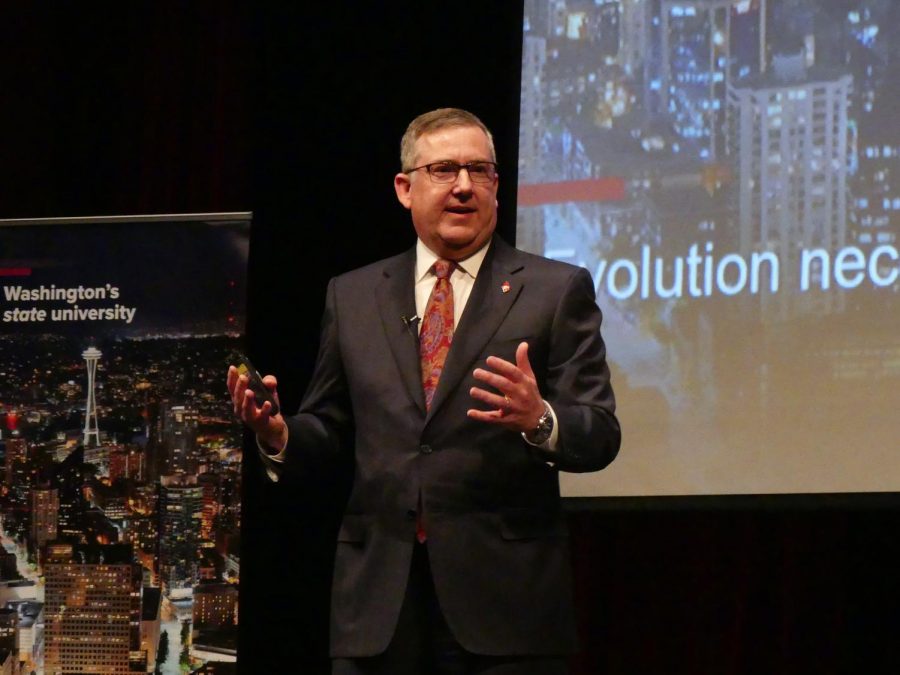Schulz delivers State of the University
WSU had highest enrollment in history this year, will receive $110 million to build research facility
President Kirk Schulz says he believes the university should consolidate its initiatives into one clear plan on Tuesday at Bryan Hall. One of the most well-known of these initiatives is the ‘Drive to 25’ campaign.
March 26, 2019
WSU President Kirk Schulz gave his annual state of the university speech Tuesday, in which he spoke about the university’s progress on the “Drive to 25” goal, as well as WSU’s engagement and contributions with the entire state of Washington.
The university’s administration has been trying to address the needs of an increasingly diverse campus, Schulz said, and the university has offered implicit-bias training for hiring committees and will be implementing system-wide training for cultural competency.
“The number of African-American faculty we have at WSU is criminally low,” he said. “We want our faculty and staff to be reflective of what our student body is and we have a long way to go.”
Schulz said over 31,000 students are enrolled at WSU across all of its campuses, the highest enrollment in the university’s history. He said 34 percent of the WSU system’s enrollment is made up of first-generation students, and 30 percent of enrolled students are from diverse backgrounds. Additionally, Schulz said 78 percent of students at WSU are in-state residents.
Schulz said the university greatly improved its standing in both the number of doctoral students who graduate from WSU, as well as the number of awards given to faculty and programs. These are two of the metrics used to measure the university’s progress toward its Drive to 25 goal, in which WSU strives to be recognized as a top-25 research university by 2030.
Schulz said WSU’s college of veterinary medicine now ranks third nationally in terms of federally funded research. He said there are international benefits; one example he mentioned was collaborative research between the College of Veterinary Medicine and the WSU Paul G. Allen School for Global Animal Health involving antimicrobial resistance research. Schulz said WSU is leading research in this area.
Schulz said the university will receive $110 million from the federal government to build a state-of-the-art research facility for collaborative use by both WSU and the Agricultural Research Service. He said this facility will help support the state’s $51 billion agriculture and food industry.
“It is important that WSU, as a land-grant university, focuses on what Washington needs to be competitive,” he said.
Schulz spoke about fulfilling WSU’s mission as a land-grant research university and serving the needs of the state of Washington. He outlined some of WSU’s extension programs across the state in which researchers and students work directly with communities and stakeholders in Washington.
He said in the future, medical students and faculty will be deployed in mobile units to practice health care in rural, under-resourced areas around the state.
Schulz said it is not just about what WSU students do in classrooms, but how they engage with communities and build relationships.
He said as a university, WSU has to continue to evolve and evaluate the way it does things.
“We got to continue to ask ourselves, ‘Just because we did some things the same way for 128 years, do we want to do it the same way going forward?’ ” Schulz said.









